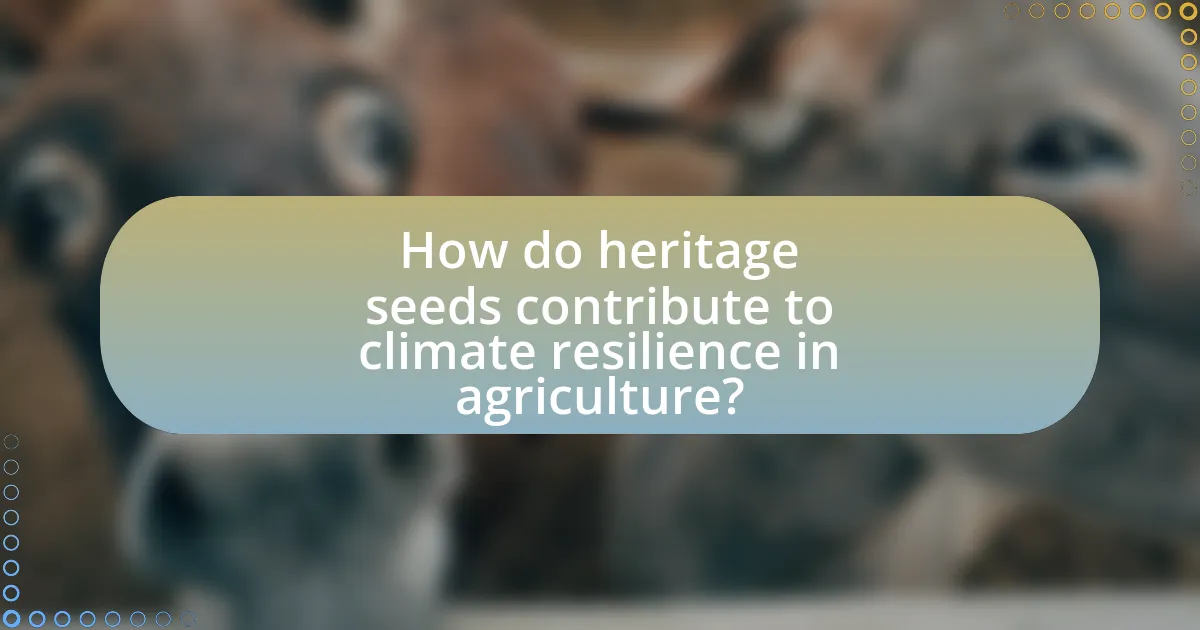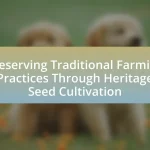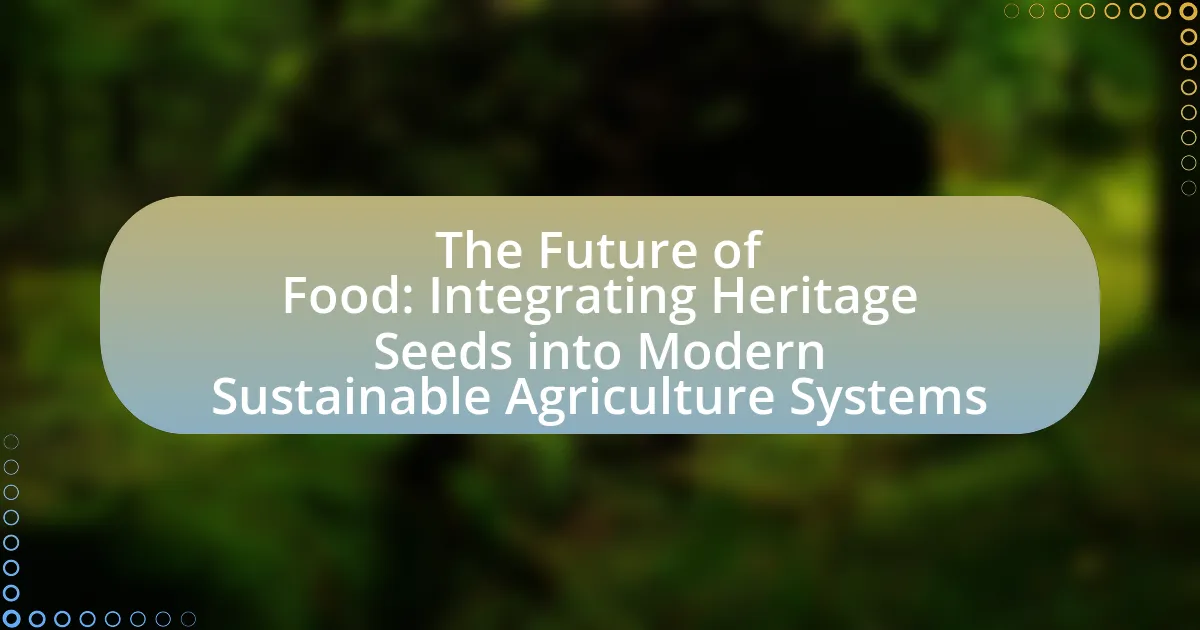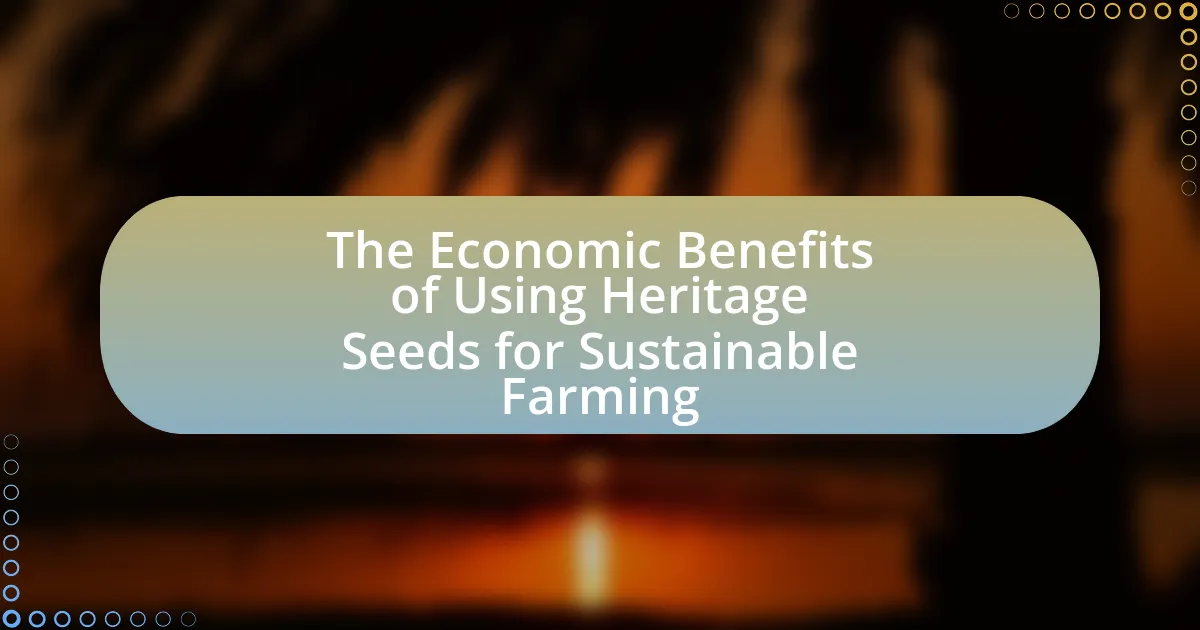Heritage seeds are traditional seed varieties that have been cultivated over generations, known for their open-pollinated nature and genetic diversity. This article explores how heritage seeds contribute to climate resilience in agriculture by enhancing adaptability to changing environmental conditions, supporting biodiversity, and reducing dependency on chemical inputs. Key topics include the characteristics that define heritage seeds, their economic benefits, and best practices for cultivation, as well as the challenges farmers face in adopting these seeds. The discussion emphasizes the importance of heritage seeds in maintaining food security and promoting sustainable agricultural practices in the context of climate change.

How do heritage seeds contribute to climate resilience in agriculture?
Heritage seeds contribute to climate resilience in agriculture by preserving genetic diversity, which enhances adaptability to changing environmental conditions. These seeds have evolved over generations in specific local climates, making them more resilient to pests, diseases, and extreme weather events. For instance, research indicates that heritage varieties can withstand drought better than modern hybrids, as they possess traits that allow them to conserve water and thrive in less favorable conditions. This adaptability is crucial for maintaining food security in the face of climate change, as diverse genetic resources enable farmers to select crops that are best suited for their specific environments.
What are heritage seeds and how do they differ from modern seeds?
Heritage seeds are traditional seed varieties that have been passed down through generations, often characterized by their open-pollinated nature, which allows them to reproduce true to type. In contrast, modern seeds are typically hybrid or genetically modified, designed for specific traits such as uniformity, disease resistance, or higher yields, but often require specific growing conditions and may not produce viable seeds for future planting. Heritage seeds have been cultivated for their adaptability to local climates and conditions, making them crucial for biodiversity and resilience in agriculture, especially in the face of climate change.
What characteristics define heritage seeds?
Heritage seeds are defined by their ability to be open-pollinated, which allows them to reproduce true to type in subsequent generations. These seeds are typically non-hybrid and have been passed down through generations, often retaining unique traits that are well-adapted to local environments. Heritage seeds are also known for their genetic diversity, which contributes to resilience against pests, diseases, and climate variability. Historical records indicate that many heritage varieties have been cultivated for over 50 years, ensuring a stable genetic lineage that supports agricultural sustainability.
Why are heritage seeds considered more resilient to climate change?
Heritage seeds are considered more resilient to climate change because they possess a diverse genetic makeup that allows them to adapt to varying environmental conditions. This genetic diversity enables heritage seeds to withstand stressors such as drought, pests, and diseases more effectively than modern hybrid seeds, which often have a narrower genetic base. Research has shown that traditional varieties can maintain yields under adverse conditions, demonstrating their adaptability. For instance, studies indicate that heritage crops can thrive in less-than-ideal soil and climate conditions, making them crucial for sustainable agriculture in the face of climate change.
How do heritage seeds support biodiversity in agriculture?
Heritage seeds support biodiversity in agriculture by preserving a wide variety of plant genetic resources that are adapted to local environments. These seeds, often heirloom varieties, contribute to genetic diversity, which enhances ecosystem resilience and stability. For instance, a study by the Food and Agriculture Organization (FAO) highlights that maintaining diverse seed varieties can improve crop yields and reduce vulnerability to pests and diseases. This genetic diversity allows farmers to select crops that are better suited to changing climatic conditions, thereby promoting sustainable agricultural practices.
What role does biodiversity play in climate resilience?
Biodiversity plays a crucial role in climate resilience by enhancing ecosystem stability and adaptability to changing environmental conditions. Diverse ecosystems are better equipped to withstand climate-related stresses, such as extreme weather events, pests, and diseases. For instance, a study published in the journal “Nature” found that ecosystems with higher species diversity can recover more quickly from disturbances, demonstrating their resilience. Additionally, biodiversity contributes to the provision of ecosystem services, such as soil fertility and water regulation, which are vital for agricultural sustainability in the face of climate change.
How do heritage seeds promote genetic diversity among crops?
Heritage seeds promote genetic diversity among crops by preserving a wide range of plant varieties that have adapted to local conditions over generations. These seeds, often heirloom varieties, contain unique genetic traits that enhance resilience to pests, diseases, and climate fluctuations. For instance, a study published in the journal “Agricultural Systems” highlights that heritage seeds can contribute to crop resilience by maintaining genetic variation, which is crucial for adapting to changing environmental conditions. This genetic diversity allows for a broader range of responses to stressors, ultimately supporting sustainable agricultural practices and food security.
What are the economic benefits of using heritage seeds in climate-resilient farming?
The economic benefits of using heritage seeds in climate-resilient farming include reduced input costs, increased biodiversity, and enhanced market opportunities. Heritage seeds often require fewer chemical inputs, such as fertilizers and pesticides, leading to lower overall farming expenses. Additionally, these seeds are adapted to local conditions, which can result in higher yields and better resilience to climate variability, ultimately improving farmers’ profitability. Studies have shown that farms utilizing heritage seeds can experience a 20-30% increase in yield stability compared to those using conventional seeds, reinforcing the economic advantages of this approach. Furthermore, heritage seeds can attract premium prices in niche markets focused on organic and sustainable products, providing farmers with additional revenue streams.
How can heritage seeds reduce dependency on chemical inputs?
Heritage seeds can reduce dependency on chemical inputs by promoting biodiversity and enhancing soil health. These seeds are often more resilient to pests and diseases due to their genetic diversity, which allows them to thrive in various environmental conditions without the need for synthetic pesticides or fertilizers. Research indicates that farms using heritage seeds can achieve higher levels of soil organic matter and microbial activity, leading to improved nutrient cycling and reduced reliance on chemical fertilizers. For example, a study published in the journal “Agriculture, Ecosystems & Environment” found that organic farming systems utilizing heritage varieties showed a significant decrease in chemical input usage while maintaining crop yields.
What cost savings can farmers expect from using heritage seeds?
Farmers can expect significant cost savings from using heritage seeds due to their adaptability and lower input requirements. Heritage seeds are often more resilient to local environmental conditions, which reduces the need for chemical fertilizers and pesticides, leading to lower overall production costs. For instance, studies have shown that farmers using heritage varieties can save up to 30% on input costs compared to those using hybrid seeds, as these traditional seeds often require less irrigation and are more resistant to pests and diseases. This cost-effectiveness is further supported by historical data indicating that heritage seeds have been cultivated for generations, demonstrating their reliability and efficiency in various climates.
How can farmers effectively integrate heritage seeds into their practices?
Farmers can effectively integrate heritage seeds into their practices by adopting a diversified planting strategy that emphasizes crop rotation and intercropping. This approach enhances biodiversity, which is crucial for resilience against pests and diseases. Research indicates that heritage seeds often possess traits such as drought resistance and adaptability to local conditions, making them suitable for sustainable agriculture. For instance, a study by the Food and Agriculture Organization highlights that heritage varieties can yield better under stress conditions compared to modern hybrids. By selecting and cultivating these seeds, farmers can improve soil health and reduce dependency on chemical inputs, thereby fostering a more sustainable agricultural ecosystem.
What challenges do farmers face when adopting heritage seeds?
Farmers face several challenges when adopting heritage seeds, including limited availability, lower yields compared to hybrid varieties, and a lack of knowledge about cultivation practices. Limited availability arises because heritage seeds are often not mass-produced, making them harder to source. Lower yields can deter farmers who prioritize productivity, as heritage seeds may not perform as well in certain conditions compared to hybrids. Additionally, many farmers lack the necessary knowledge and resources to effectively cultivate and manage heritage seeds, which can lead to unsuccessful harvests. These challenges can hinder the broader adoption of heritage seeds, despite their potential benefits for biodiversity and climate resilience.
How can farmers overcome these challenges?
Farmers can overcome challenges related to climate resilience by adopting heritage seeds, which are more adaptable to local conditions and climate variability. Heritage seeds have been shown to possess traits such as drought resistance and pest tolerance, making them suitable for fluctuating environmental conditions. Research indicates that using heritage seeds can enhance biodiversity on farms, which in turn supports ecosystem services that are crucial for sustainable agriculture. For instance, a study published in the journal “Agricultural Systems” highlights that farms utilizing heritage varieties experienced a 20% increase in yield stability during adverse weather events compared to those relying on commercial hybrids. This evidence supports the effectiveness of heritage seeds in helping farmers navigate the challenges posed by climate change.

What specific climate challenges can heritage seeds address?
Heritage seeds can address specific climate challenges such as drought, soil degradation, and biodiversity loss. These seeds are often adapted to local climates and conditions, making them more resilient to extreme weather events like droughts. For instance, studies have shown that heritage varieties can maintain yields under water-scarce conditions better than modern hybrids. Additionally, heritage seeds contribute to soil health by promoting diverse root systems that enhance soil structure and fertility, which is crucial in combating soil degradation. Furthermore, by preserving a wide range of genetic diversity, heritage seeds help maintain ecosystem balance, which is essential for resilience against pests and diseases exacerbated by climate change.
How do heritage seeds perform in drought conditions?
Heritage seeds generally perform better in drought conditions compared to modern hybrid seeds. This resilience is attributed to their genetic diversity, which allows them to adapt to varying environmental stresses, including limited water availability. Studies have shown that heritage varieties often possess traits such as deeper root systems and better water retention capabilities, enabling them to survive and produce yields even during periods of drought. For instance, research conducted by the University of California found that certain heritage tomato varieties maintained higher yields under drought stress than their hybrid counterparts, demonstrating their potential for sustainable agriculture in changing climates.
What traits make heritage seeds suitable for drought resilience?
Heritage seeds are suitable for drought resilience due to their deep root systems, adaptability to local climates, and genetic diversity. These traits enable them to access water from deeper soil layers, survive in varying environmental conditions, and withstand stressors associated with drought. Research indicates that heritage varieties often possess traits that have been naturally selected over generations, allowing them to thrive in specific regions with limited water availability. For example, studies show that certain heritage crops can yield better under drought conditions compared to modern hybrids, demonstrating their effectiveness in maintaining agricultural productivity during water scarcity.
How have farmers successfully used heritage seeds in drought-prone areas?
Farmers have successfully used heritage seeds in drought-prone areas by selecting varieties that are naturally resilient to water scarcity and adapting them to local conditions. These seeds often possess traits such as deep root systems and drought tolerance, which allow crops to survive with limited water. For instance, research has shown that heritage varieties of millet and sorghum can yield better in arid conditions compared to modern hybrids, as they have evolved over generations to withstand drought. Additionally, farmers practicing traditional seed-saving techniques ensure the preservation of these resilient varieties, enabling them to maintain agricultural productivity even in challenging climates.
How do heritage seeds respond to extreme weather events?
Heritage seeds generally exhibit greater resilience to extreme weather events compared to modern hybrids. This resilience is attributed to their diverse genetic makeup, which allows them to adapt to varying environmental conditions. For instance, studies have shown that heritage varieties often possess traits such as drought tolerance and disease resistance, enabling them to survive and thrive during periods of extreme heat or heavy rainfall. Research conducted by the University of California found that heritage crops maintained higher yields under stress conditions than their hybrid counterparts, demonstrating their potential for sustainable agriculture in the face of climate change.
What evidence supports the resilience of heritage seeds in floods or storms?
Heritage seeds demonstrate resilience in floods and storms due to their genetic diversity and adaptability. Research indicates that these seeds have evolved over generations in specific local environments, allowing them to withstand extreme weather conditions better than modern hybrids. For instance, a study published in the journal “Agricultural Systems” by authors Altieri and Nicholls highlights that heritage varieties often possess traits such as deeper root systems and drought resistance, which enhance their survival during adverse weather events. Additionally, historical data shows that farmers using heritage seeds have reported higher survival rates of crops during flooding compared to those using commercial seeds, further supporting their resilience in such conditions.
How can heritage seeds adapt to changing temperature patterns?
Heritage seeds can adapt to changing temperature patterns through their genetic diversity, which allows them to withstand a range of environmental conditions. This adaptability is rooted in their long history of cultivation, where they have developed traits that enable them to thrive in various climates. For instance, certain heritage varieties have been shown to possess heat tolerance, drought resistance, and the ability to adjust their growth cycles in response to temperature fluctuations. Research indicates that these seeds can maintain yield stability even under stress conditions, making them crucial for sustainable agriculture in the face of climate change.

What are the best practices for cultivating heritage seeds?
The best practices for cultivating heritage seeds include selecting appropriate varieties, ensuring genetic diversity, practicing crop rotation, and maintaining soil health. Selecting heritage seed varieties that are well-adapted to local climates enhances resilience against environmental stresses. Genetic diversity within heritage seeds allows for better adaptability to changing conditions, reducing the risk of total crop failure. Crop rotation helps prevent soil depletion and pest buildup, while maintaining soil health through organic amendments and minimal tillage supports robust plant growth. These practices are supported by research indicating that diverse cropping systems can improve yield stability and resilience in the face of climate variability.
How can farmers ensure the quality of heritage seeds?
Farmers can ensure the quality of heritage seeds by implementing rigorous selection and preservation practices. This includes selecting seeds from healthy plants that exhibit desirable traits, such as disease resistance and adaptability to local conditions. Additionally, farmers should maintain proper storage conditions to prevent seed degradation, such as keeping seeds in a cool, dry place to preserve viability. Research indicates that heritage seeds, when properly managed, can maintain their genetic integrity over generations, thus contributing to agricultural biodiversity and resilience against climate change.
What methods can be used for seed saving and storage?
Seed saving and storage methods include drying, proper packaging, and maintaining optimal environmental conditions. Drying seeds reduces moisture content, which is crucial for preventing mold and decay; for instance, seeds should be dried to around 10-12% moisture. Proper packaging involves using breathable materials like paper envelopes or glass jars to protect seeds from pests and light. Additionally, storing seeds in a cool, dark, and dry environment, ideally at temperatures below 50°F (10°C), significantly extends their viability, as evidenced by studies showing that seeds stored under these conditions can remain viable for several years.
How can farmers maintain the purity of heritage seed varieties?
Farmers can maintain the purity of heritage seed varieties by implementing isolation techniques, practicing careful seed selection, and conducting regular genetic testing. Isolation techniques, such as physical distance between different seed varieties and using barriers, prevent cross-pollination, which can alter the genetic makeup of heritage seeds. Careful seed selection involves choosing seeds from the healthiest plants that exhibit the desired traits, ensuring that only the best genetic material is propagated. Regular genetic testing allows farmers to monitor the genetic integrity of their seeds, confirming that they remain true to their heritage variety. These methods are supported by agricultural studies indicating that maintaining genetic purity is crucial for preserving the unique traits of heritage seeds, which contribute to biodiversity and resilience in changing climates.
What resources are available for farmers interested in heritage seeds?
Farmers interested in heritage seeds can access a variety of resources, including seed banks, agricultural extension services, and online databases. Seed banks, such as the Seed Savers Exchange, preserve diverse heritage seed varieties and provide them to farmers. Agricultural extension services offer guidance on cultivation practices and the benefits of using heritage seeds, while online databases like the USDA’s National Plant Germplasm System provide information on seed availability and characteristics. These resources support farmers in enhancing biodiversity and adapting to climate challenges.
Where can farmers find heritage seed suppliers?
Farmers can find heritage seed suppliers through various channels, including local seed exchanges, agricultural cooperatives, and specialized online retailers. Local seed exchanges often host events where farmers can trade seeds, while agricultural cooperatives may offer access to heritage seeds as part of their services. Additionally, online retailers such as Seed Savers Exchange and Baker Creek Heirloom Seeds provide extensive catalogs of heritage seeds, allowing farmers to purchase directly. These sources are recognized for their commitment to preserving genetic diversity and promoting sustainable agriculture practices.
What organizations support the use of heritage seeds in agriculture?
Organizations that support the use of heritage seeds in agriculture include the Seed Savers Exchange, the Organic Seed Alliance, and the Center for Food Safety. These organizations advocate for the preservation and use of heritage seeds to promote biodiversity, sustainable farming practices, and food security. For instance, the Seed Savers Exchange has a mission to conserve and promote heirloom seeds, which are vital for maintaining genetic diversity in crops. The Organic Seed Alliance focuses on research and education to enhance organic seed systems, emphasizing the importance of heritage seeds in sustainable agriculture. The Center for Food Safety works to protect biodiversity and promote sustainable agriculture practices, including the use of heritage seeds as a means to combat climate change impacts on food systems.
What practical tips can farmers follow to maximize the benefits of heritage seeds?
Farmers can maximize the benefits of heritage seeds by implementing crop rotation, selecting appropriate planting times, and utilizing organic farming practices. Crop rotation enhances soil health and reduces pest and disease pressure, which is crucial for the success of heritage seeds that may be more susceptible to local conditions. Selecting planting times based on local climate patterns ensures optimal growth conditions, as heritage seeds often thrive in specific environments. Additionally, organic farming practices, such as composting and natural pest control, support the biodiversity that heritage seeds rely on, promoting resilience against climate variability. These strategies are supported by research indicating that diverse cropping systems improve agricultural sustainability and productivity.





